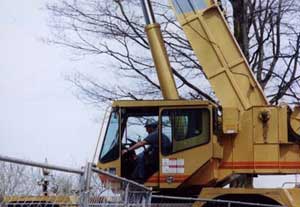Crane Operator
Tasks & duties

Crane operators may do some or all of the following:
-
check the crane's air, water, oil, fuel and other mechanical parts
-
drive mobile cranes to and from worksites
-
identify and control any hazards associated with lifting objects
-
ensure lifting equipment meets required standards and is in good working order
-
grease moving parts of the crane
-
check the crane is set up correctly and is secure
-
make sure the load to be lifted is within the safe lifting capacity of the crane
-
move the load and place it in the required position
-
understand and follow directions from the dogman (who directs the crane operator from the ground, radio control or buildings)
Specialisations
There are many different kinds of cranes, each requiring specific skills. Crane types include:
-
mobile cranes
-
crawler cranes
-
tower cranes
-
truck-mounted cranes
-
travelling gantry cranes
-
overhead cranes
-
container and harbour cranes
Crane operators might also be involved with crane site supervision and rigging and slinging (securing) of loads.
Skills & knowledge

Crane operators need to have:
-
knowledge of the safety regulations that govern crane operation, such as road regulations and vehicle weight permits
-
knowledge of the weight limits for various cranes
-
knowledge of how to maintain cranes
-
knowledge of hand signals, including the ability to interpret them
-
communication skills
-
decision-making skills
-
first aid skills
Entry requirements
To become a mobile crane operator you need to have a Class 4 Heavy Vehicle Licence and you must be at least 18 years old to drive a mobile crane on the road.
Some employers require crane operators to have a National Certificate in Crane Operation and a Certificate in Construction Site Safety from Site Safe New Zealand.
Employers may also require that their crane operators have no criminal record.
Secondary education
There are no specific secondary educational requirements, but three years of secondary education is recommended.
Tertiary education
Courses in crane operating are offered through the crane industry training organisation, Opportunity – The Training Organisation, and other approved training providers.
An Approved Code of Practice for Cranes is being prepared by representatives of the crane and inspection industries, and the Department of Labour. The code, which is expected to be adopted in 2009, will require crane operators to have unit standards in crane operating or equivalent training.
Training on the job
Skills are gained on the job and you can get a National Certificate in Crane Operation while working.
Crane operators attend courses and seminars to keep up to date with changes in the building construction industry, and changes to health and safety regulations and crane technology.
Useful experience
Work in the building construction or engineering industries, truck driving or experience operating earthmoving machinery may be useful.
Related courses
Automotive Vehicle Operations
Plant and Machine Operations
For more information, please refer to Career Services.
Sponsors include
Document Actions
